


New Year's Resolution Ideas for Kids (and Tips for Parents)
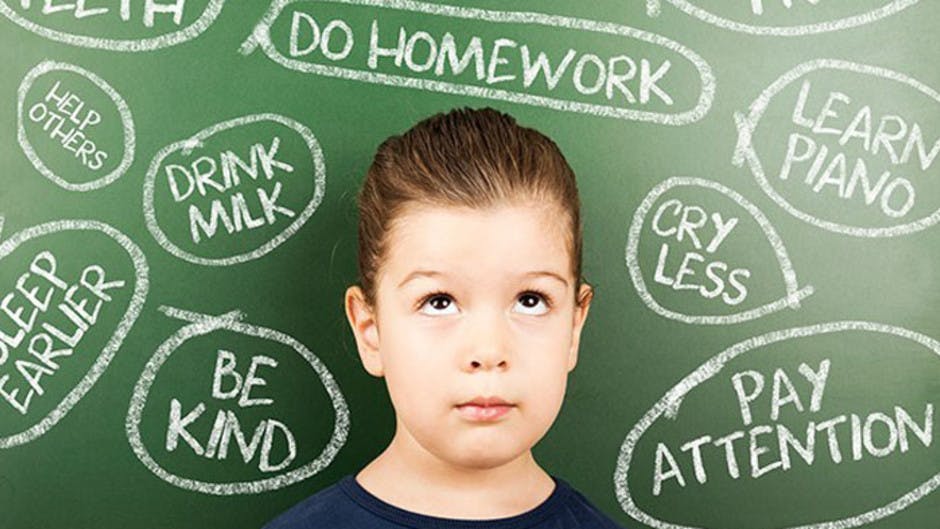
The start of a new year is an exciting time filled with hope and possibility. It’s a perfect opportunity to set goals and aspirations, not just for adults but also for our children. New Year’s resolutions can help kids develop a growth mindset and build positive character traits like resilience and perseverance.
Making New Year's resolutions with your child is a great way to teach them about setting goals and how to work towards achieving them.
When children learn to set achievable goals, they discover something magical. They learn that they have the power to shape their own development. These early experiences teach valuable lessons about:
Believing in their ability to learn and improve
Breaking big goals into small, manageable steps
Understanding that effort and attitude matter more than perfection
Developing resilience and a positive approach to challenges.
By guiding your child through the resolution-setting process, you're doing more than planning for a new year. You're helping your child build a foundation of self-confidence, curiosity and personal growth that will serve them throughout their lives.
Read on to discover ideas and practical tips to start the new year with your kids ready for growth and achievement.
New Year's resolution ideas for kids
1. Read regularly
Reading for 30 minutes a day is a great way to improve reading fluency, vocabulary and comprehension skills.
Ideas and tips to help your child read regularly
Establish a daily or weekly reading routine at a regular time (e.g. after breakfast, after school or before bed)
Create a comfortable reading space or 'nook' where they can read; ensure the space has adequate lighting and supports a healthy posture
Use interactive online reading apps, such as Reading Eggs, to keep your child motivated and easily track their time spent reading
Provide a range of different reading materials for variety; try to have a print-rich environment at home
Read books aloud together; it's a wonderful way to bond and share the joy of reading
Reward your child for their achievements, such as reading streaks or 'levelling' up
Decorate their reading space with colourful progress charts and awards for their achievements.
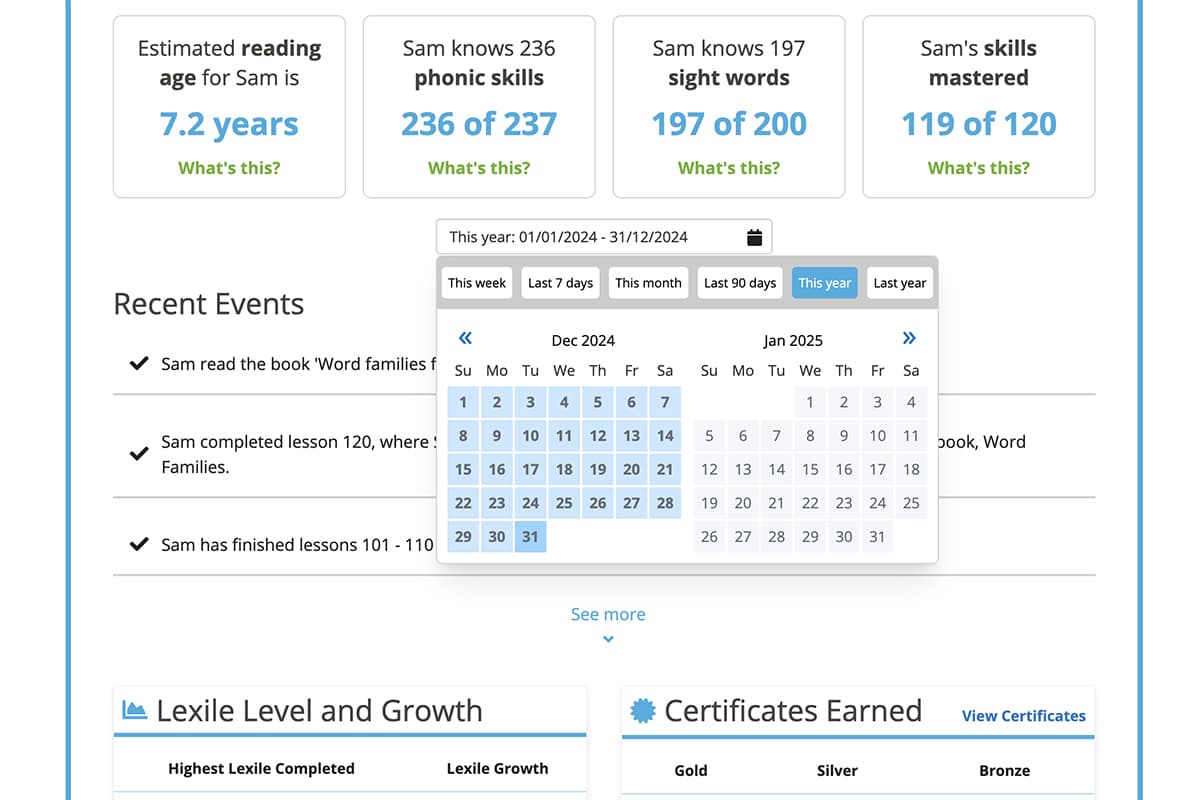
Reading Eggs makes it easy for parents to see how much time their child has spent reading and their achievements over different timeframes. Free trial
2. Read more books
In addition to improving your child's reading skills, reading books can also nurture their imagination and build their empathy and critical thinking skills. It can also expand their general knowledge.
Reading books is often the spark that ignites a love of reading and a lifelong habit of reading for pleasure.
If your child hasn't yet discovered the joy of reading books and set this goal for themselves, encourage them to do so. It might be because they just haven't yet found the right book (or type of book) to ignite the spark for them.
Ideas and tips to help your child read more books
Guide them to set a specific and measurable goal that is realistically achievable. For example, if their goal is to read x number of books by the end of the year, have them break it down into monthly or daily targets; for longer texts, they might aim to read a chapter a day
If they have a favourite genre or type of book (e.g. graphic novels or comics), don't discourage them from sticking to what they like
If your child doesn't yet love reading or want to read for pleasure, encourage them to explore more diverse reading materials and a mix of fiction and nonfiction titles
Visit libraries in your area and use online libraries, such as the Reading Eggs Library, to discover new books
Look for suitable book clubs or reading challenges they could join to stay motivated; ask your local library or their school for suggestions
Make it fun by tracking progress on a chart, with colourful stickers or stamps for each book completed
A Reading Journal is a great way to keep track of books read, write reviews and reflect on their favourite part of the book or what they learned.
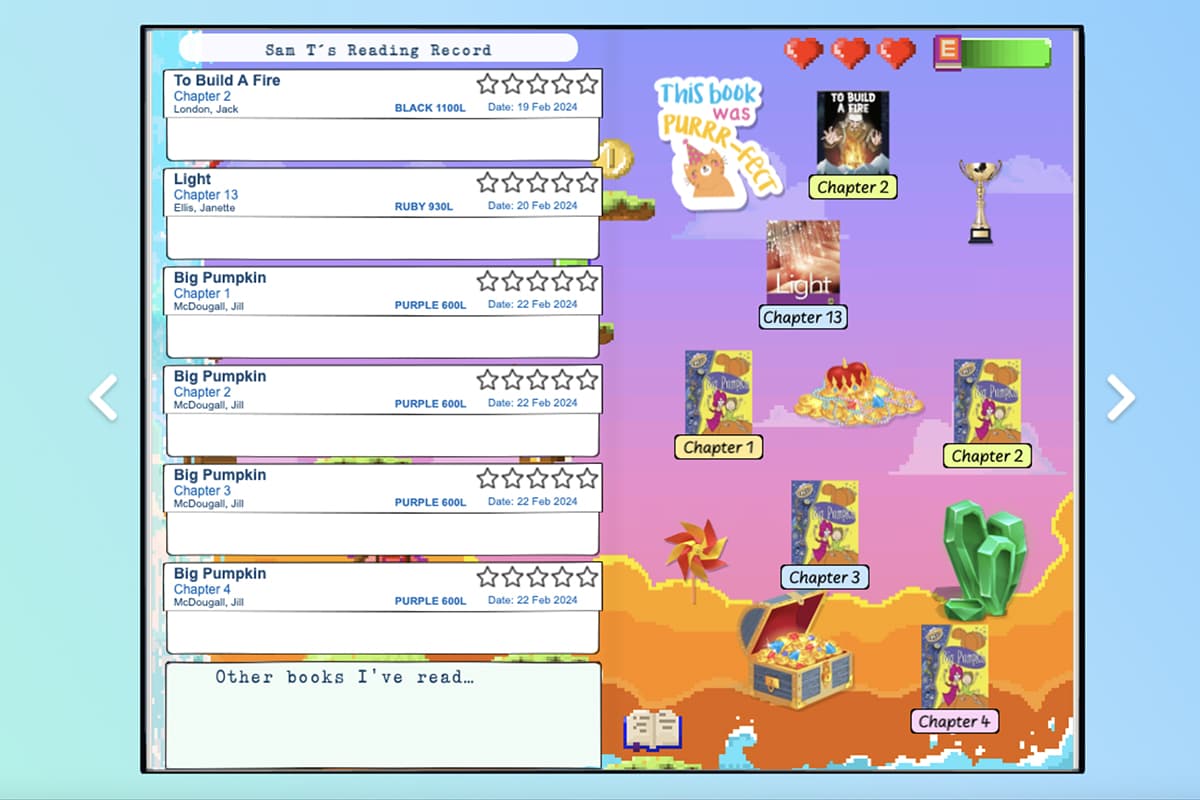
The Reading Eggs online reading journal automatically tracks every book your child reads in the program; they can rate and review each book and make notes. Your child can customise and decorate their journal with fun stickers and graphics to make it their own. Free trial
3. Read more broadly
Reading more broadly keeps things exciting and has many benefits for your child's cognitive, emotional and social development.
If your child already loves reading books, encourage them to read more diversely to discover new favourites and expand their knowledge. If your child doesn't yet love reading, provide them with a mix of book types (e.g. fiction, nonfiction, graphic novels and books from different genres) to help them discover what they like.
Ideas and tips to encourage your child to read more broadly
Explore different genres with your child, such as fantasy, mystery, science fiction and biographies, so they are familiar with the choices available
Show your child how to find different types of books and genres at your local library, book store and online
Another option is to choose authors from different backgrounds or books about diverse cultures
You could have your child pick a theme for the entire year or change it each month; alternatively, the choice can be random.
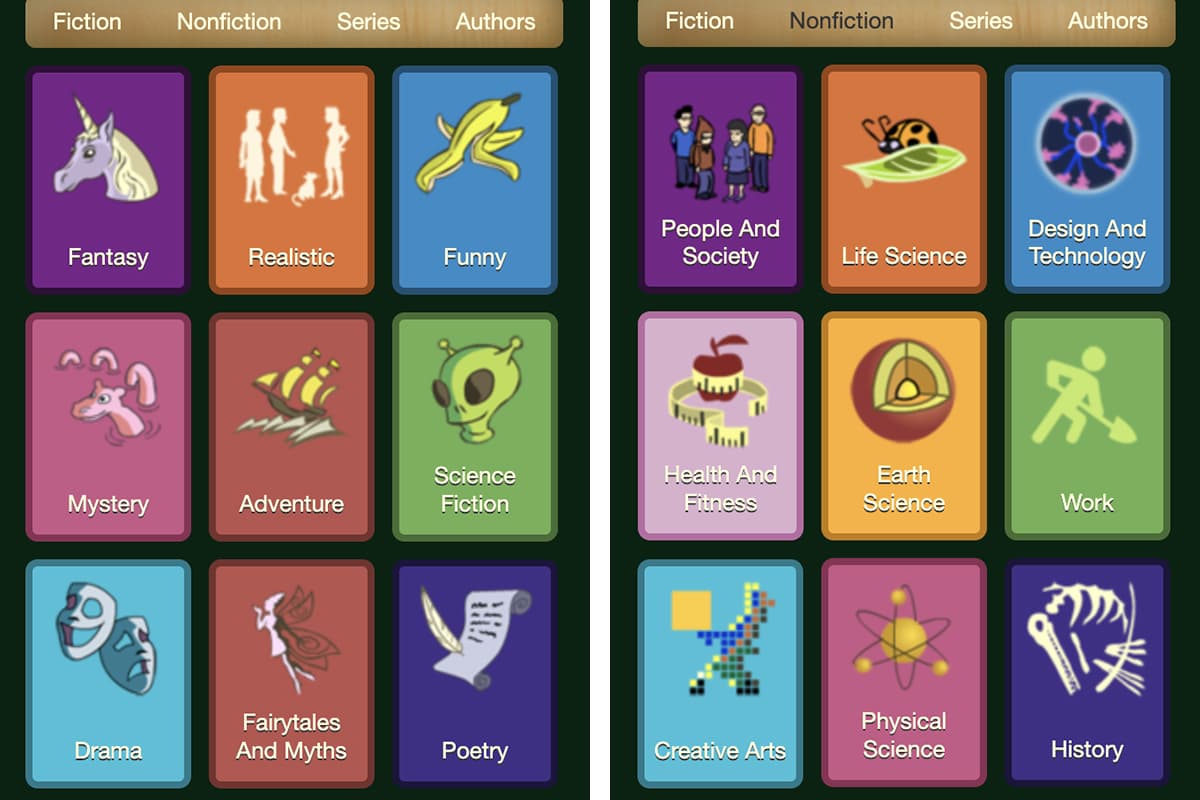
The online Reading Eggs Library contains over 4000 fiction and nonfiction e-books covering a range of genres. The books in the Library can be browsed by subject, series, author and reading level. Free trial
4. Regularly learn something new
Another way for your child to expand their knowledge and improve their reading skills is to explore a new subject or learn a new skill.
They might like to choose one subject or skill to dive deeply into over the whole year, or they could choose a different one each month. For example, January could be focused on learning about whales, February they might practise baking the perfect brownie, and so on.
Ideas and tips for expanding their knowledge and nurturing a growth mindset
Create a learning 'bucket list' together; write down things your child wants to learn or discover during the year
Review and update the list monthly, checking off things they've accomplished
Encourage your child to document their progress through videos or a scrapbook
Celebrate their efforts and progress, not just achievements
Allocate a portion of your child's book reading time to reading factual, nonfiction books to arouse their curiosity and broaden their knowledge of the world around them
Start a curiosity journal for your child to write down questions they want to explore and research
Visit museums, historical sites, nature reserves and places they've never been before
Provide opportunities for your child to share what they've learned with you and your family.
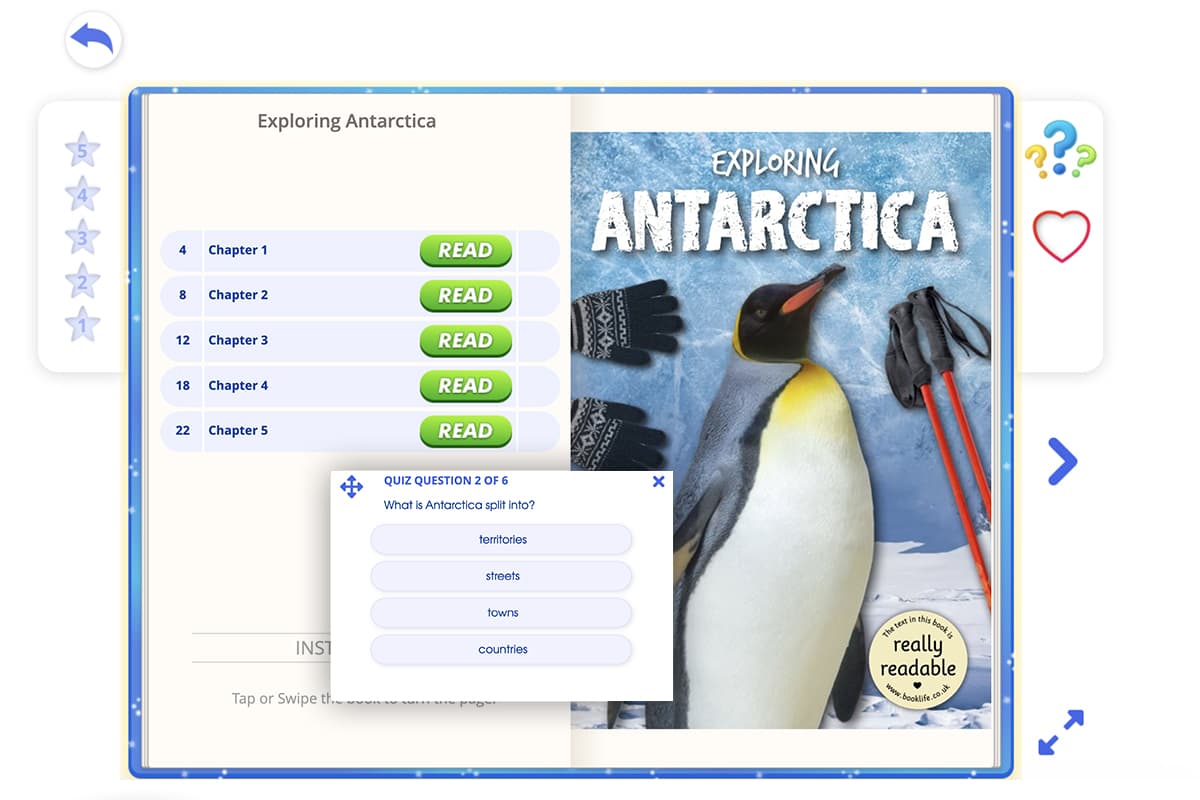
Reading nonfiction books is a great way for your child to learn something new.
By expanding their knowledge, children will also improve their reading comprehension skills.
5. Build their vocabulary
Learning new words helps children communicate better. A rich and broad vocabulary makes it easier to share ideas clearly in both speaking and writing. As children learn what different words mean, they also learn more about the world around them.
Ideas and tips to help your child build their vocabulary
Encourage your child to learn a new word every day or each week
Have them practise using their chosen word in sentences and stories
Create a word wall (or use the refrigerator) to post the new word so it's easily visible and stays front of mind
Set up a vocabulary journal for your child to record words they’ve learned and successfully used in context
Use online reading programs, such as Reading Eggs, to help your child discover new words at the appropriate difficulty level and to automatically track new words they've learned
Your child can utilise interactive, online educational games to test their word knowledge, such as the Vocabulary Pursuit contest in the Reading Eggspress Stadium.
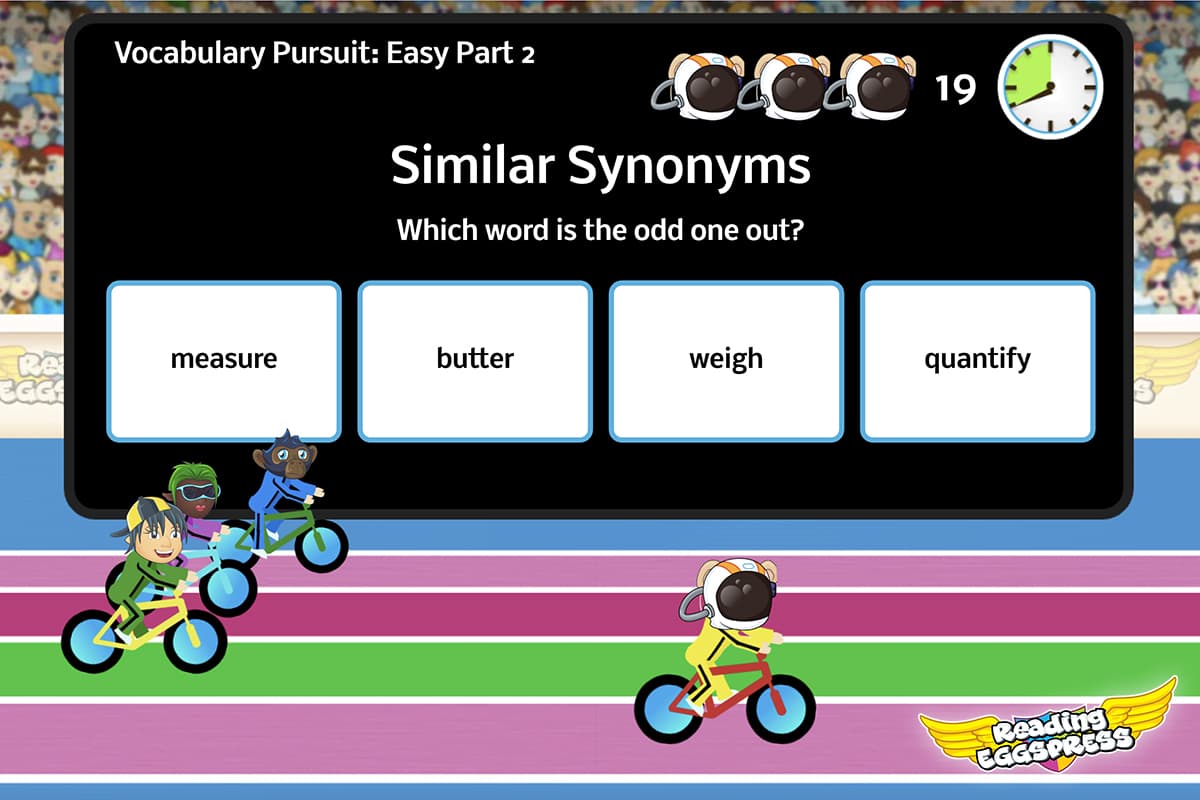
The Vocabulary Pursuit contest in the Reading Eggspress Stadium is a fun way for children to test their vocabulary knowledge in a race to the finish line. Free trial
Check out our article for more tips on how to help your child build their vocabulary.
6. Write more
Writing is a powerful tool that can benefit children in countless ways. By encouraging your child to write more often, you can help them develop essential skills like critical thinking, problem-solving and creativity.
Putting pen to paper (or fingers to keyboard) can help children clarify their thoughts, organise their ideas and express themselves more clearly. As they write, they'll also improve their vocabulary, grammar and spelling.
Just like any other skill, writing gets better with practice. The more your child writes, the more confident and fluent they'll become. And the benefits extend beyond writing itself. Strong writing skills can lead to better reading comprehension, improved academic performance and enhanced communication abilities.
Ideas and tips to get your child writing more
Help your child start a journal where they can write about their day and express their thoughts and feelings; a journal provides a great opportunity for regular writing practice
Encourage them to write creative stories, picture books or poems; these could be inspired by books they've read, movies watched or hatched from their imagination
Make sure there are plenty of writing materials (pens, pencils, writing pads) to hand
'Publish' their writing by creating homemade books together.
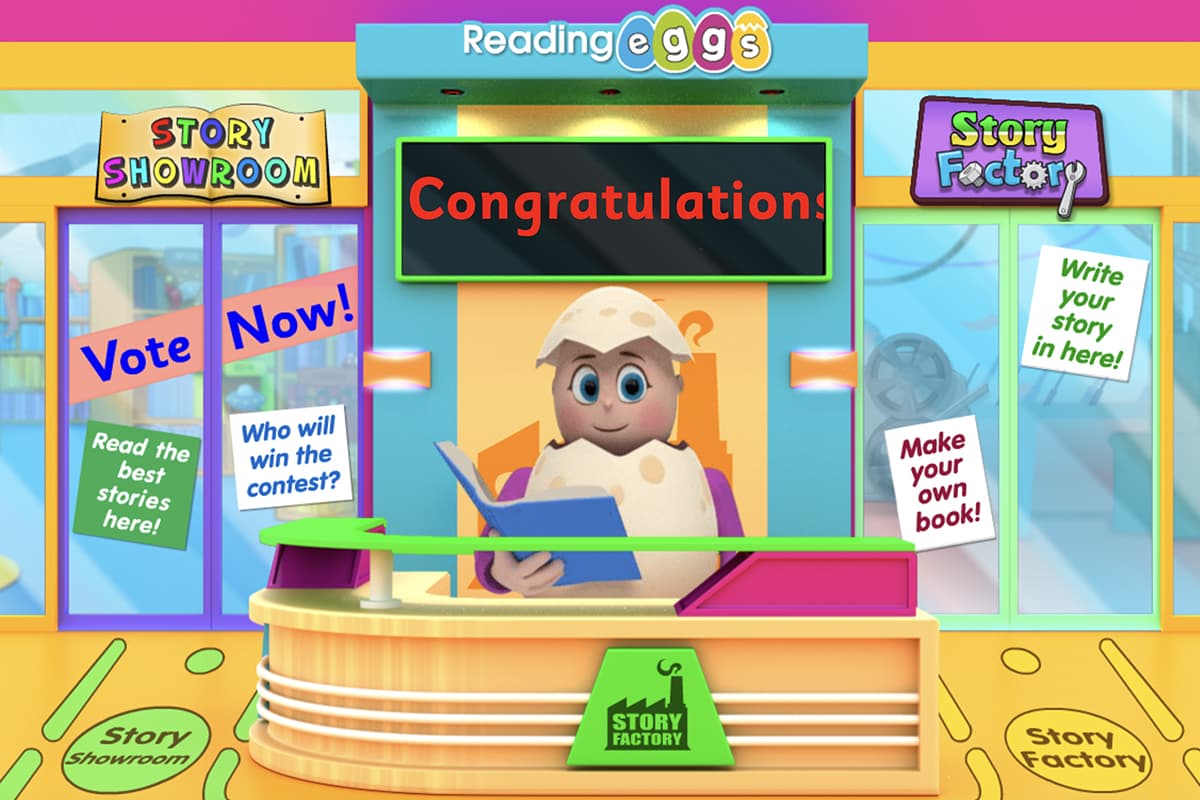
Children can submit stories they've written to the Story Factory in Reading Eggs. Free trial
Check out our article for more tips and ideas on how to help your child improve their writing skills.
Make it easy and fun for your child to achieve their reading goals with Reading Eggs
Reading Eggs is the perfect tool to help your child reach their reading goals. With fun and interactive game-like lessons, activities and thousands of e-books, your child will be motivated to learn and read every day. Their confidence will soar as they progress through their personalised learning journey and they'll be rewarded for their achievements. Plus, you'll receive regular progress updates to track their growth. Begin the new year ready with all the resources your child needs to achieve their reading goals. Start your 30-day free trial today!
New Year's resolution tips for parents
Most of us know how difficult it can be to keep a New Year's resolution. Below are our top tips for helping your child set and achieve their resolutions for the coming year:
1. Let them set their own goals
Guide your child's decisions and make suggestions, but ultimately, let them decide which goals they want to work towards. By playing an active role and 'owning' their goals, your child will be more motivated to keep them. They'll also feel a greater sense of accomplishment when they reach the goals they set for themselves.
2. Make sure their goals are realistically achievable
At the start of a new year, when the end seems so far away, it's tempting to add lots of items to our resolutions list. However, a long list can dilute our focus and become overwhelming, which can lead to feeling demotivated. Guide your child to set a reasonable number of goals that are realistically achievable.
3. Match goals to their age and abilities
It's best to set different goals for each child, especially if there are significant age differences and diverse abilities. Preschoolers might aim to put away their toys, wash their hands or help feed their pets each day. Older children might have more challenging and academically focused goals.
4. Avoid being too specific for some children
Avoid limiting your child's curiosity by setting goals that are too specific or restrictive, particularly for young children and children with special needs. Allow for flexibility and exploration.
5. Make goal-setting a family ritual
Show your child that setting goals and personal growth are important by making the process a family ritual. Each December, or the first week of January when the festivities are over, sit down together to reflect on the past year. Take turns to announce each one of your goals for the new year and, above all, be supportive of each other.
6. Put it in writing
Create a New Year's resolution poster for the family and have each person write down their goal for the new year. Display the poster somewhere it can be seen daily, such as on the refrigerator.
7. Stay positive
Be prepared for lapses throughout the year and help your child to stay positive and motivated. If they've missed reaching their target a few times, avoid making them feel bad and instead focus on addressing what has caused the lapse and finding a solution.
8. Nurture a growth mindset
Personal growth can sometimes be uncomfortable and difficult. If your child has been trying to achieve their goals but has fallen short, point out that growth comes from the effort of trying: Every failed attempt has lessons to teach us and is a step towards success next time. Focus on helping them to identify the learnings.
9. Be a good role model
Show your child how you are actively working towards achieving your own goals. Be sure to demonstrate and teach your child other positive personality traits, like working as a team to achieve goals. For example, if your child wants to spend more time outdoors, arrange outdoor activities with the whole family so they can learn how enjoyable it can be.
10. Take small steps
Break your child's yearly goals into smaller activities for each day, week or month to start turning their good intentions into habits. For example, if they want to help around the house more, they can begin by making their bed each morning. If they continue to make improvements over time, like setting the table for dinner, feeding the dog twice a day or completing a specific list of chores on weekends, these tasks will become habitual.
11. Check in and be encouraging
Set a date to check in on your child's progress every month. Focus on being encouraging and supportive rather than nagging. Make sure there is a way for both you and your child to track their progress.
12. Celebrate their growth
Be sure to celebrate your child's growth and achievements. It's a wonderful opportunity to reinforce positive behaviour and encourage future goal-setting. Importantly, acknowledge their progress, the efforts they’ve put in and the lessons they've learned along the way, not just the outcome. Doing so will nurture a growth mindset and inspire your child to keep setting and achieving goals. You might celebrate with a special outing, their favourite treat or a personalised certificate that recognises their hard work. Check out our article for more reading rewards ideas.
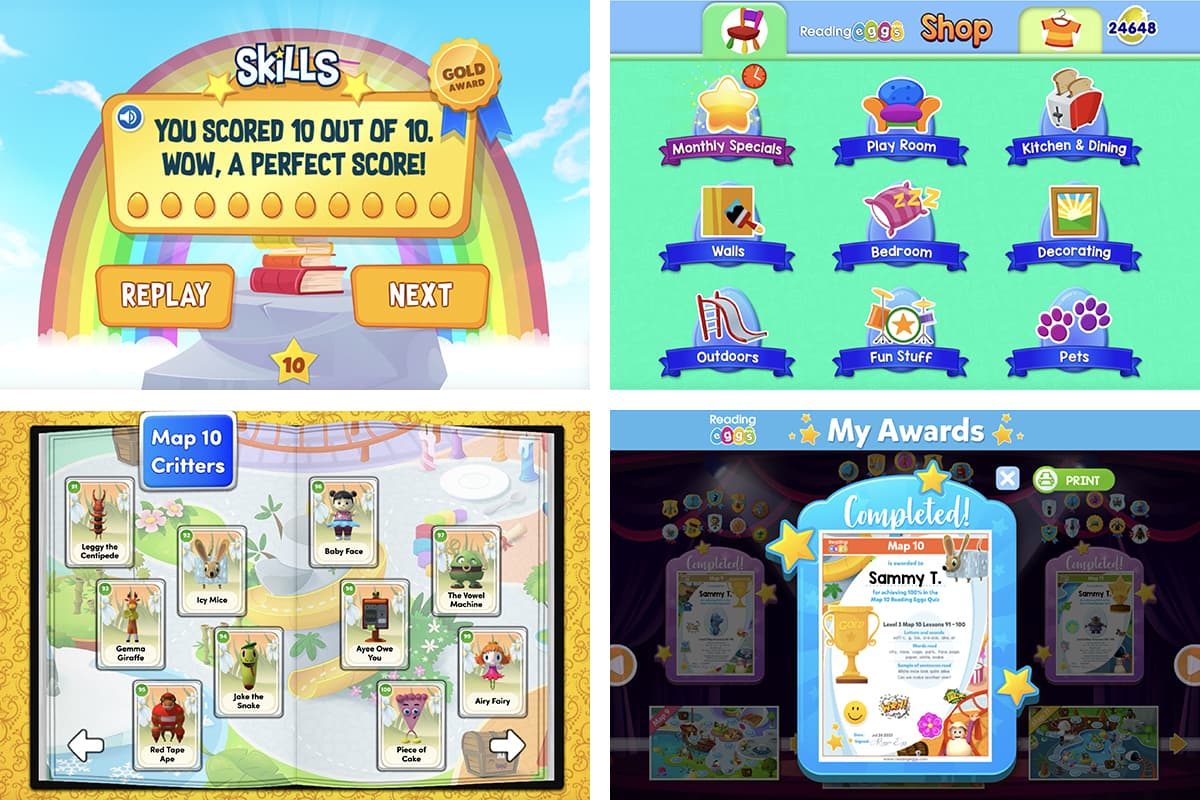
Reading Eggs rewards your child's achievements in multiple ways as they progress, such as earning golden eggs, hatching critters and receiving personalised certificates at the end of each map. Free trial
The Reading Eggs Ultimate Rewards Book adds another level of engagement and makes it easy to track and celebrate your child's achievements in the online program. Bursting with over 200 stickers, interactive activities, a keepsake height chart, overviews of each map and the lessons your child is working on, it's the perfect offline companion.
The Ultimate Rewards Book is available to purchase online in selected regions:
Make it easy and fun for your child to achieve their reading goals with Reading Eggs
Reading Eggs is the perfect tool to help your child reach their reading goals. With fun and interactive game-like lessons, activities and thousands of e-books, your child will be motivated to learn and read every day. Their confidence will soar as they progress through their personalised learning journey and they'll be rewarded for their achievements. Plus, you'll receive regular progress updates to track their growth. Begin the new year ready with all the resources your child needs to achieve their reading goals. Start your 30-day free trial today!






